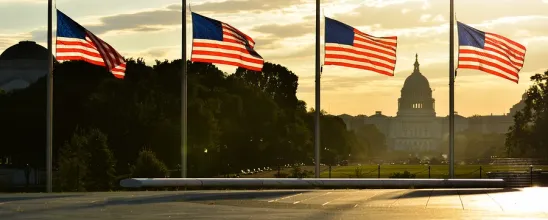President Donald Trump issued an executive order (EO) Thursday directing federal agencies to streamline their permitting processes to allow for expedited movement on infrastructure projects as a means of contributing to a swift recovery of the American economy as states and US territories emerge from their coronavirus-driven lockdowns. The president’s order came as policymakers prepared for the release of the latest national employment data, information that will factor into the ongoing debate over the way to approach the issue of federal unemployment assistance in the next COVID-19 response legislation. Black Americans have borne the brunt of the economic damage from the pandemic, a reality lawmakers in both parties will be compelled to take into account as they seek to craft a consensus coronavirus measure this summer after a wave of public fury over police brutality and racial inequities in America.
Topics covered in today’s report include: tax and economic development, health, international trade, infrastructure, government oversight and developments at the state level.
"The economic meltdown that has devastated the country amid the coronavirus pandemic has proven uniquely damaging for black Americans, threatening to exacerbate an already staggering racial wealth gap and fueling nationwide protests focused on racial justice,” reports POLITICO’s Megan Cassella. “Black workers are more likely to be out of a job, to have lost income or to have left the labor market altogether, economic data and surveys show – and less than half of black adults are now employed.”
The funeral of George Floyd will be held Tuesday in Houston, a service that is likely to underscore the severity of the aforementioned challenges and the need for Washington to address them in the next phase of federal COVID-19 relief.
The nonpartisan Congressional Budget Office (CBO) on Thursday offered a mixed bag of guidance to federal policymakers on the unemployment benefits question with an analysis projecting that an extension of the enhanced benefits approved this spring, currently set to expire at the end of July, will boost economic performance this year if they are extended through the end of 2020, but will have the opposite effect next year because a disincentive for individuals to return to the workforce will have been established.
The White House and many Members of Congress continue to look to infrastructure policy as a tool for helping to restore jobs and help resuscitate the country’s ailing economy. The president’s executive order calls for “accelerating the nation’s economic recovery from the COVID-19 emergency by expediting infrastructure investments and other activities,” and directs federal agencies to “utilize existing legal authorities to respond to the full dimensions of the national emergency and its economic consequences,” including “statutes and regulations that allow for streamlining of government decision-making processes in exigent circumstances.” The order is likely to face court challenges from organizations focused on environmental issues.
Tax and Economic Development Updates
With the US Department of Labor this morning announcing a significant decline in the unemployment rate to 13.3%, it appears that the reopening of the economy – along with the impact of the federal stimulus measures thus far – is beginning to have an effect. These surprising numbers may ease pressure on lawmakers as they move forward with additional COVID-19 relief legislation – especially as relates to the issue of extending the US$600 expanded unemployment insurance payments included in the HEROES Act. This may also give a boost to alternative proposals such as the US$1,200 return to work bonus proposed by House Committee on Ways and Means Ranking Member Kevin Brady (R-TX) or a US$450 weekly return to work bonus contemplated by Senate Committee on Finance Member Rob Portman (R-OH).
Despite the positive jobs report, however, we expect the push for additional federal relief measures will continue. For example, yesterday, the Alliance to Save Energy – which includes nearly 800 contractors and manufacturers – urged Congress to “address the massive job losses in the energy efficiency sector by strengthening a federal tax incentive encouraging consumers to make efficiency improvements to their homes.” Specifically, the group is proposing that Congress “strengthen[] and moderniz[e] the Sec. 25C tax credit for homeowner improvements, the 179D tax deduction for commercial buildings, and the 45L tax credit for construction of high-efficiency new homes.” At the same time, Ranking Member Brady is also promoting a number of additional tax policy changes as part of the ongoing federal response to COVID-19, including increasing the employee retention tax credit, expanding the research and development (R&D) tax credit and allowing full and immediate expensing of buildings and property.
Additionally, the Internal Revenue Service late last night announced deadline relief for Opportunity Zone investors impacted by COVID-19. According to its updated guidance, taxpayers who sold property for an eligible gain and who would have had 180 days to invest in a Qualified Opportunity Fund (QOF) to defer that gain will have until the end of the year to make that investment if the taxpayer’s 180th day to invest in a QOF would have fallen on or after April 1, 2020, and before December 31, 2020. The guidance also provides that the period between April 1, 2020, and December 31, 2020, is suspended for purposes of the 30-month period during which property may be substantially improved.
Finally, with the Paycheck Protection Program Flexibility Act now passed, lawmakers are already beginning to look at additional legislation to make further changes to the Paycheck Protection Program (PPP). For example, Senator John Cornyn (R-TX) last month introduced S. 3612, the Small Business Expense Protection Act, which would provide that tax deductions for ordinary business expenses and “other tax incidents” are not affected by the exclusion from gross income of amounts related to loan forgiveness received in response to COVID-19. While Treasury Secretary Steven Mnuchin previously called this a “double dip,” CQ is reporting that the bill may soon be taken up in the Senate, as there are only “one or two holdouts.”
Health Updates
CQ reports this morning that the Centers for Disease Control and Prevention (CDC) will issue new testing guidance in the coming days. According to CQ, “The guidance will be issued in conjunction with the White House Coronavirus Task Force and will give recommendations about when tests should be administered and what type of tests are most appropriate for different settings, said Assistant Health and Human Services Secretary for Health Brett Giroir.” On Thursday, the Department of Health and Human Services (HHS) announced new laboratory data reporting guidance for COVID-19 testing. The guidance “specifies what additional data must be reported to HHS by laboratories along with . . . COVID-19 test results.” Notably, laboratories will now be required to report racial and ethnic demographics of test results. During his testimony yesterday in front of the House Committee on Appropriations Subcommittee on Labor, Health and Human Services, Education and Related Agencies, CDC Director Robert Redfield apologized for the “inadequacy” of CDC’s reporting regarding racial disparities in COVID-19 patients. The laboratory guidance also “standardizes reporting to ensure that public health officials have access to comprehensive and nearly real-time data to inform decision making in their response to COVID-19.” This guidance comes after reports that the CDC and some states were conflating the results of viral and antibody tests.
After this week’s announcement that Admiral Brett Giroir, Assistant Secretary for Health, will be stepping down from his role overseeing COVID-19 testing – with no replacement planned – Senate Committee on Health, Education, Labor and Pensions (HELP) Ranking Member Patty Murray (D-WA) wrote to Vice President Michael Pence. She stated, “Eliminating this role and deprioritizing this essential part of the COVID-19 response when our testing capacity is far off from what is needed to keep communities safe is wrong. I strongly urge you to reconsider walking away from this responsibility and putting the lives and livelihoods of people across the country at risk.” During his testimony yesterday, CDC Director Redfield stressed the need for individuals who have participated in protests in recent days to be tested for COVID-19, noting that these gatherings could lead to increased virus transmissions.
Yesterday, the Centers for Medicare & Medicaid Services (CMS) posted the first set of underlying COVID-19 nursing home data and inspections results on Nursing Home Compare. As we reported earlier this week, CMS plans to enhance enforcement for facilities with persistent infection control violations, and it will also impose enforcement actions on facilities with lower level infection control deficiencies “to ensure they are addressed with increased gravity.” More information on the nursing home surveys, planned enforcement actions and quality improvement activities is available here.
The Government Accountability Office (GAO) released a report on “Infectious Disease Modeling: Opportunities to Improve Coordination and Ensure Reproducibility.” It examined how HHS is using and assessing models, which can be leveraged to predict COVID-19’s course. GAO recommended “HHS (1) develop a way to routinely monitor, evaluate, and report on modeling coordination efforts across multiple agencies and (2) direct CDC to establish guidelines to ensure full reproducibility of its models.” In response to the report’s findings, Democratic and Republican leaders of the House Committee on Energy and Commerce stated, “We hope that HHS will apply these findings to help with response efforts now and for future public health emergencies. As we are learning lessons from this outbreak, we will continue working together in a bipartisan way to help overcome this pandemic.”
Trade Updates
On Thursday, Senate Majority Leader Mitch McConnell (R-KY) criticized China on the Senate floor on a range of issues including censorship, the South China Sea and Hong Kong, among other policies, and spoke about the Tiananmen Square protests of 1989. Leader McConnell’s remarks come at a time of heightened tensions in the US-China bilateral relationship and increased scrutiny by Congress. We have identified almost 300 bills and resolutions introduced this Congress focused on China, many of which introduced since the beginning of the COVID-19 pandemic.
Later that day, and in follow up to his May 29 remarks on China and Hong Kong, President Trump released a “Memorandum on Protecting United States Investors from Significant Risks from Chinese Companies.” The memorandum directs the Treasury Secretary to convene the President’s Working Group on Financial Markets to discuss the risks posed to investors by Chinese companies listed on US stock exchanges that do not follow transparency and auditing requirements, and recommendations for the executive branch to respond to such risks.
Also on Thursday, the Senate Committee on Banking Housing and Urban Affairs held a hearing on the situation in Hong Kong and the policy tools available to the US government. During the hearing, Senator Pat Toomey (R-PA) discussed the Hong Kong Autonomy Act, a sanctions bill he introduced with Senator Chris Van Hollen (D-MD) in May. While the bill has received positive press and garnered bipartisan support, congressional staff tell us the bill is unlikely to become law as currently drafted.
Infrastructure Updates
On Wednesday, House Transportation and Infrastructure Democrats unveiled a five-year, US$494 billion surface transportation reauthorization proposal, the Investing in a New Vision for the Environment and Surface Transportation (INVEST) in America Act. The legislation emphasizes resilient infrastructure, repair backlog and zero-emission transportation. The House Committee on Ways and Means, which controls the revenue title of surface transportation reauthorization, has not released a draft, so how the bill will be funded is still unknown. While drafting of surface transportation legislation is traditionally a bipartisan process, Transportation and Infrastructure Ranking Member Sam Graves (R-MO) issued a statement after the bill’s release, noting “Democrats and Republicans alike know the only way to complete a reauthorization is if we work together. For decades, that’s been the proven formula for successfully producing surface transportation laws. Unfortunately, driven by the Speaker’s partisan agenda, Committee Republicans were not involved in the development of this bill.” Committee Chairman Peter DeFazio (D-OR) has indicated that the House has the votes to pass the bill without Republican support. The bill is scheduled for markup on June 17.
Separately, President Trump signed an EO on “Accelerating the Nation’s Economic Recovery from the COVID-19 Emergency by Expediting Infrastructure Investments and Other Activities.” Broadly, the EO aims to accelerate federal project development by streamlining the regulatory process, instructing the secretaries of Transportation, Army, Defense, Interior and Agriculture to use all relevant and pre-existing emergency authority to expedite projects. This emergency authority includes flexibility with National Environmental Policy Act, Endangered Species Act and Clean Water Act requirements. The EO also instructs the secretaries to make legislative suggestions related to infrastructure that will help aid economic recovery.
Oversight Updates
PPP investigations continue. In a complaint unsealed yesterday, another person was charged with wire fraud, bank fraud and making false statements to a financial institution and the Small Business Administration. This person, like several others charged in the last month, sought over US$8 million in PPP loans for nonexistent payroll expenses. Earlier this week, a financial institution in Georgia disclosed it had received a civil investigative demand from the Department of Justice in connection with a PPP False Claims Act investigation. Related to PPP loans, Reuters reports a glitch in the SBA’s loan processing system may have caused as many as 1,200 loans to be issued more than once because the system failed to account for the fact that many borrowers submitted applications with multiple lenders. Reuters also reports that some PPP loans went to companies that paid no US corporate tax for the last year. While PPP eligibility is not tied to the payment of taxes, CARES Act watchdogs may raise issues that taxpayer-funded support may have gone to companies that have paid no taxes themselves.
Yesterday, Senator Chuck Grassley (R-IA), chair of the Senate Committee on Finance, blocked two of President Trump’s nominees from advancing further in the confirmation process, as leverage in order to obtain answers as to his recent firing of federal watchdogs. The senator has now sent two letters seeking, as the Inspector General Act requires, an explanation for the president’s removal of State Department Inspector General (IG) Steve Linick and Intelligence Community IG Michael Atkinson beyond his “loss of confidence” in them. White House Counsel’s response failed to provide a fuller explanation. The senator issued the following statement in the congressional record: “I intend to maintain this hold until the notice requirement in the Inspector General Act of 1978, 5 U.S.C. app. § 3(b) is met and the reasons for the IC [and State] IGs removal are provided.” The senator also tweeted, “Im placing holds on 2 Trump Admin noms until I get reasons 4firing 2 agency watchdogs as required by law Not 1st time ive raised alarm when admins flout IG protection law Obama did same& got same earfull from me All I want is a reason 4 firing these ppl CHECKS&BALANCES.”
State Updates
Attorneys General have been very aggressive in using state price gouging authorities during the COVID-19 crisis. Florida in particular has investigated numerous claims but yesterday cleared a private hospital near Palm Springs of wrongdoing despite complaints they were charging US$150 for administering COVID-19 tests they purchased for about US$11 apiece. Attorney General Ashley Moody (R) said that after an “in-depth review of the facts” charges in the matter were not justified. The Florida governor had commented the US$150 cost was “not acceptable” and claimed COVID-19 tests should be free.
New Jersey Governor Phil Murphy (D) this week announced a series of recommendations and actions for long-term care facilities to address systemic challenges in long-term care, mitigate the effects of COVID-19 and reduce impacts of future outbreaks. The recommendations present a roadmap for rebuilding a high-functioning long-term care system that emphasizes quality of care, patient safety, robust data infrastructure and strong staff supports.
Texas Governor Greg Abbott (R) announced yesterday that the state’s Health and Human Services Commission (HHSC) will provide approximately US$177 million in emergency Supplemental Nutrition Assistance Program (SNAP) food benefits for the month of June in response to the COVID-19 pandemic. HHSC received federal approval from the Department of Agriculture to extend the maximum allowable amount of SNAP benefits to recipients based on family size. More than 900,000 SNAP households will see the additional amount on their Lone Star Card by June 12.
Mara Sheldon and Elaine Hillgrove contributed to this article.







 />i
/>i
